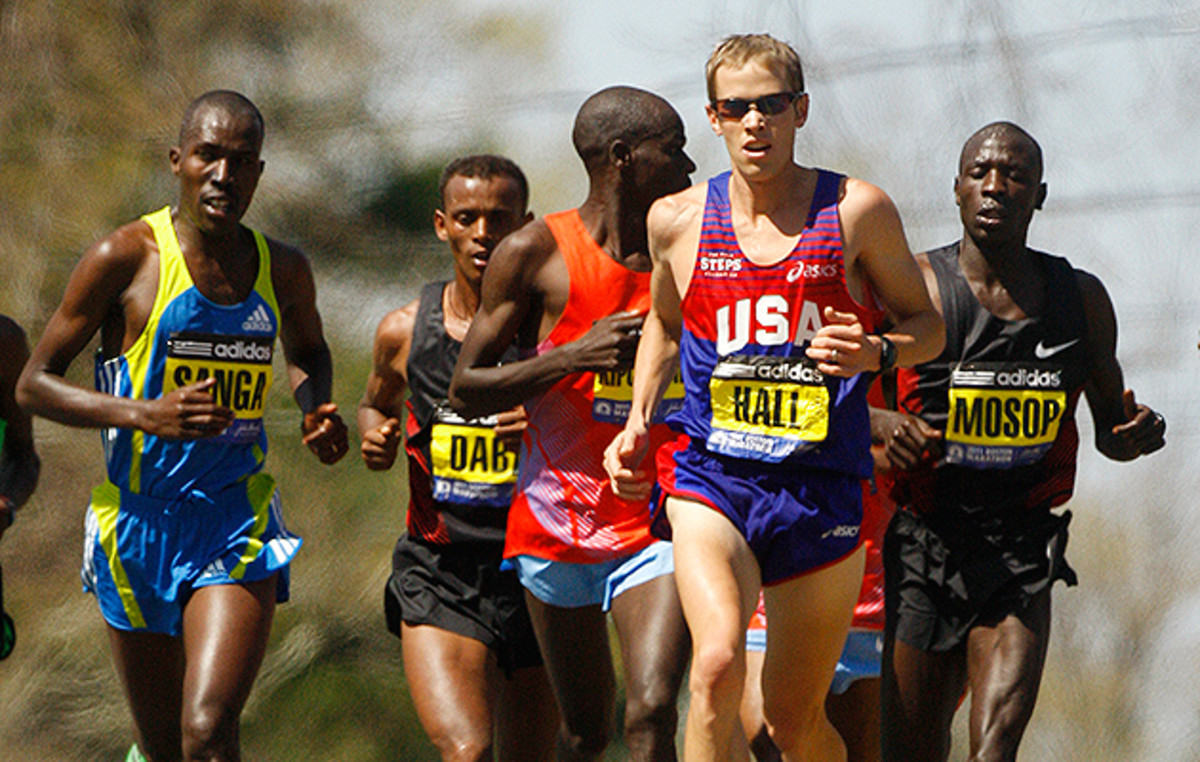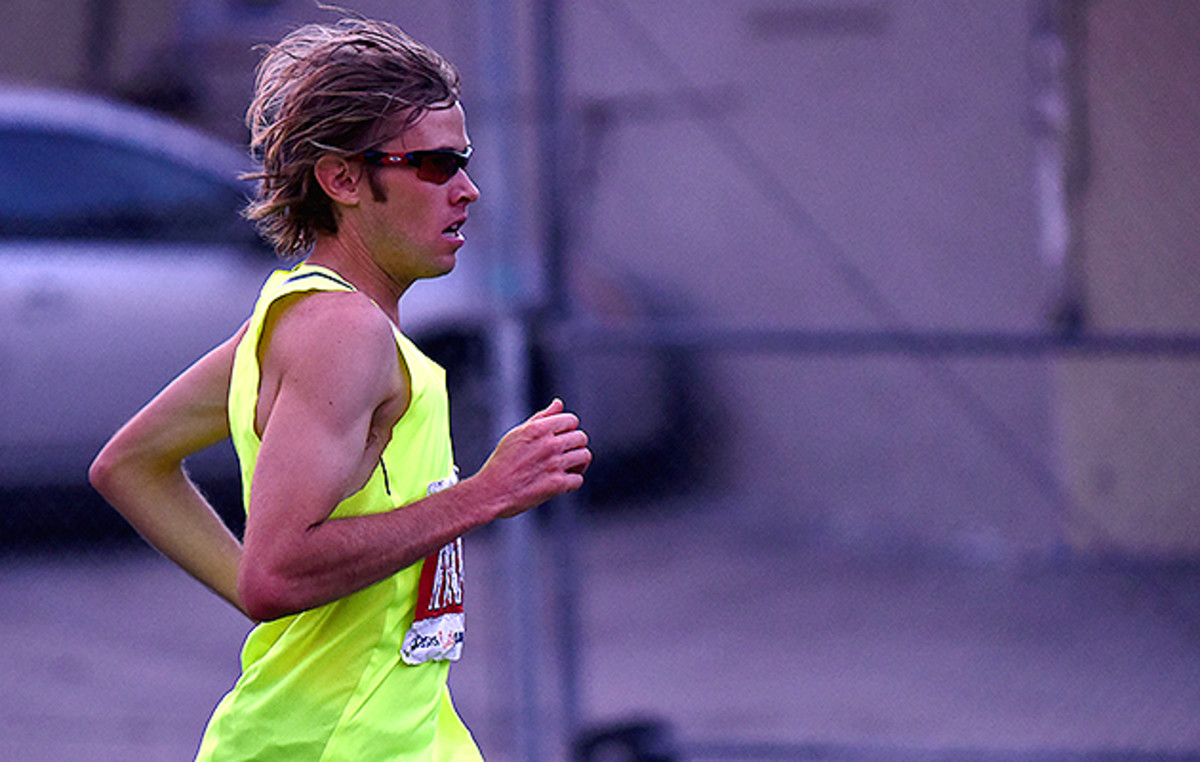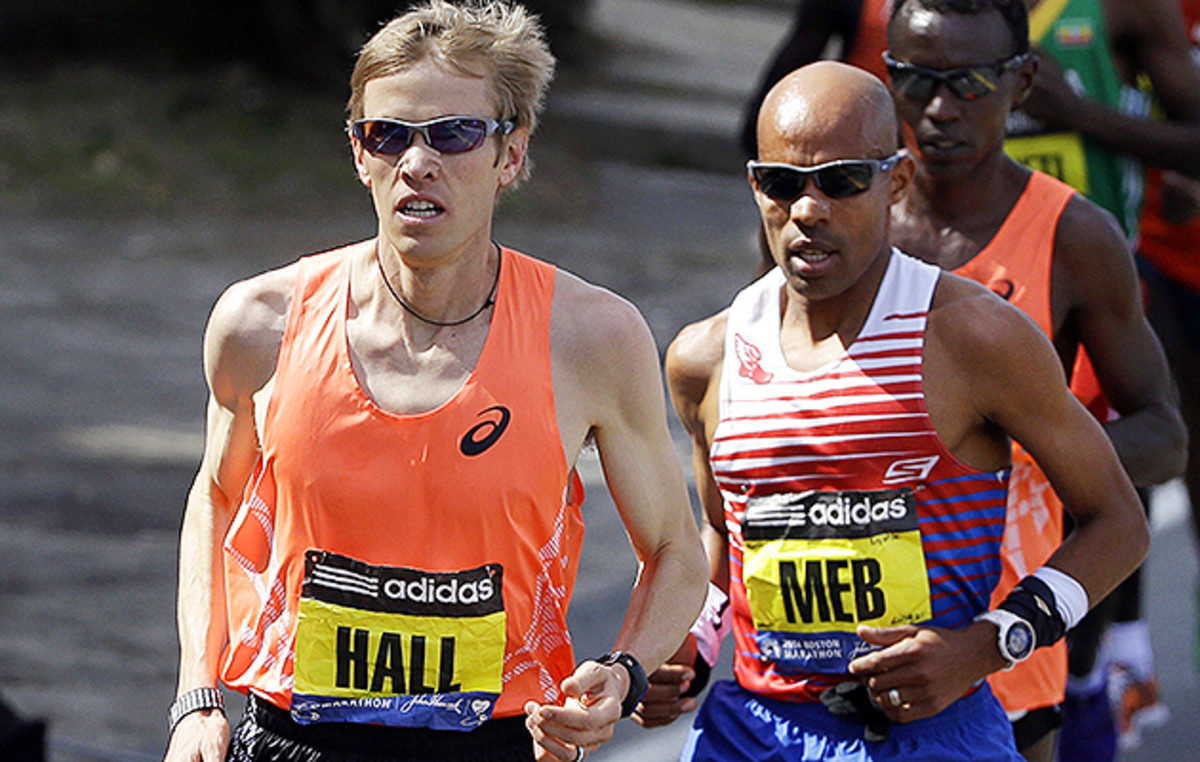Ryan Hall set to run seven marathons in seven days on seven continents

Sometimes when Ryan Hall looks in the mirror he still gets a little surprised. He’s no longer the 140-pound runner who five years ago produced the fastest marathon ever by an American.
Since Hall and his wife, Sara, adopted four Ethiopian girls last fall, family pictures throughout his house have also changed and taken over his home in Redding, Calif. In many of those framed photos, Hall is still quite lean from his marathon training. A Sports Illustrated photo of him running in front of the Eastern Sierra mountains ahead of the 2008 Olympics accurately depicts his physique from that era.
“I’m still tripping out when I see pictures of myself from when I was running,” Hall says with a laugh. “I think, ‘Who is that guy?’ I don’t look anything like that anymore.”
Hall is now committed to the gym, and he was doing toe raises in the weight room when he received a text from his friend Matthew Barnett, a pastor at the Dream Center (a volunteer-driven organization that aims to help gang members, drug addicts, orphans and others in need in the Los Angeles area), about a challenge. At the time, Hall had only been running about 30 minutes at a time, three days a week.
“After I stopped running, I had zero desire to go run,” Hall says. “I kind of lost all that joy of running.”
• Power play: What cyclists can teach us about energy efficiency
The text was about the possibility of running seven marathons in seven days on the seven continents. Something came over Hall when he read it and he texted back, “That sounds epic.”
Next January, Hall will embark on that challenge in order to raise support and awareness for the Dream Center, a place where he has done public speaking events before. The tentative race schedule will start in Antarctica and take him to Recife, Marrakech, Athens, India, Australia and then San Francisco or Los Angeles.
“Sara and I are passionate about issues related to poverty and empowering people out of those situations,“ Hall says. “Knowing this challenge was presented for those reasons and the epic component of it, I thought this was amazing. The idea of it gripped me and gave me a desire to run again.”

Hall was known for having fun in his running, even as he ran 2:04:58 at the 2011 Boston Marathon. As he ran through the Wellesley College tunnel of screaming women, he pumped his arms and there was never a sign of strain as he powered his way to his historic time.
This past April, Hall returned to the streets of Boston and met with fans. He certainly looked bigger. Fans would joke about how athletes tend to get fat and out-of-shape in retirement. One even said to him, “You’re just like me now!” He went to London to cheer on his wife Sara in the marathon but chubby jibes followed across the pond.
• Veteran stars and fresh faces to watch at Olympic track and field trials
When one critic in Boston walked away, he turned to his former teammate and now agent Josh Cox and said “I’m actually really fit.” Cox knew first hand that Hall wasn’t lying. Since the winter the two had been making regular trips to the gym together.
Hall took things into his own hands, so he snapped a shirtless photo in the mirror and posted it on Twitter.
Me at the end of bulking about to start my first cut (165 lbs). Starting to feel a little soft. pic.twitter.com/wAvb9QAYZz
— - (@ryanhall3) April 21, 2016
The retweets and mentions blew up. Runner’s World followed up and detailed his workout routine. He was no longer the scrawny marathoner but he sure wasn’t fat.
When Hall was trying to bulk up, he was taking in more calories than he ever had while still keeping his food clean. Hall was eating six meals a day—primarily healthy proteins and healthy fats.
He experienced some frustration when he would step on the scale after taking in some food and the scale would read the same as earlier in the day. At one point, he was eating six eggs for breakfast and another six before going to bed, while also packing proteins throughout the day.
Hall is now back down to 2,500 calories per day as he increases his running in training.

In the months since Barnett’s text, Hall has upped his mileage and uploaded his workouts online (to the delight of online message board users). He returned to racing with two two-hour segments (one was 13-kilometers and the other 19-kilometers in rocky and technical trails) in June’s “Beat the Sun” Relay, a trail race in France.
“I’m not going to be in 2:10 shape,” Hall said from his home in Redding while still recovering from the race. “I am going to train for it and I will be prepared for it. I want to run something decent.”
Hall is now in his cutting phase as he tries to shed a bit of fat. Cox says that Hall is starting to look a bit more like his older brother, Steve, who has been into lifting since high school. Hall is still curious about how big he can get with his frame but targets a lean 175 pounds for the races.
• Russia’s Olympic track and field ban a small step for drug-soaked sport
“For me, it would be great to be able to float along at 6:00 to 6:30 pace per mile and feel good at that,” he adds. “My body is now gradually adjusting to its weight. Those first few runs were terrible. I was just lumbering around like a brick. I’ve gotten power back in my legs.”
He used to hate doing certain hill workouts but now he embraces them. Cox recalls that, when they were teammates on the Mammoth Track Club, Hall hated going to the gym; Now he can be found there constantly.
“He’s taken the same approach and intensity that he did with running,” Cox says. “One of the first times we went into the gym together, I asked how many sets and reps we would do. Ryan just turned to me and said, ‘I just go to exhaustion.’ I just laughed because that’s just the way he does it.”

Hall’s important takeaway was that he could push again. Training for the Boston Marathon or the New York City Marathon became a chore for Hall toward the end of his career. Hall dropped out of the London Olympic marathon due to a hip injury, which then led to multiple other scratches from major marathons with other health problems. Workouts fell off, and it didn’t help that his testosterone levels had been depleted.
“When I was running throughout my career, I always thought I had this bucket list of races that I wanted to do,” Hall said. “There’s longer stuff like Comrades Marathon [an 87-kilometer race in Durban, South Africa] and fun races that I didn’t get a chance at. The way my career ended, I had zero desire for anything. Now that it’s back, I’m just doing these epic challenges for fun and supporting what I believe in.”
The lifestyle change has also put his testosterone levels back in the “clinically normal range.” The fire behind Hall’s drive to run has been rekindled through his lofty weight training goals. He wants to be able to deadlift 300 pounds and squat 300 pounds. He says he’s not very close to those lifting goals right now but he’s working toward it.
• Athletes protesting at Olympic track and field trials over sponsorship rights
“My body finally feels good,” Hall said. “When I pushed myself to the max, that’s when I enjoyed running. At the same time, my focus is also going to be on the impact that my running will have on something like the Dream Center, rather than on how fast I’m running.”
Cox tore his plantar fascia in the eighth mile of the 2012 U.S. Olympic Trials while Hall went on to make his second Olympic team with a runner-up finish to Meb Keflezighi. Cox could not walk for two months after that and has not raced at that high a level since. He still doesn’t rule out the possibility of racing an ultramarathon or longer race but he knows the feeling that Hall is experiencing at the moment.
“The best athletes are super competitive in life,” Cox says. “Whether it’s playing a board game or playing a pickup game of basketball, that competitive fire is something they don’t lose. It’s something every athlete has to face when your body can’t give you what it used to. You have to take that competitive fire and pour it into something else.”
That energy will have to carry Hall through 168 hours and 183.4 miles.
*****
WHAT DID HALL EAT?
When he was running:
– 60% carbohydrates
– 20% protein
– 20% fat
Bulking phase:
– 60% protein
– 20% carbohydrates
– 20% fat
Foods to make it happen (3,400 to 4,000 calories per day): Alaskan salmon, Muscle Milk that he puts into pancakes and oatmeal
